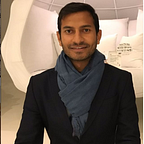When Vikram Sarabhai worked from home.
My mother has been impatient ever since I relocated from Bangalore to Mumbai. I couldn’t blame her; no amount of explanation about how comfortable I was in Mumbai was going to satisfy her. The family is asking you all, “Why can’t we just manage something remotely?” I’m sure many of you have experienced a situation like this. Today’s ruckus brings back memories of Vikram Sarabhai’s decision to work remotely.
It was Sept 1939 and war had broken out in Europe. Ambalal Sarabhai was worried and insisted his brothers to come home immediately. Somehow, months into the war Vikram Sarabhai made it back to India. He was however worried about his interruption in studies. After making frantic communications with Cambridge, they finally asked him that the only possibility of continuing his “work from home” would be possible as long as it can be supervised by CV Raman. So, in 1940 Vikram Sarabhai started his work from home in India specifically in Bengaluru.
Robert Millikan, an American scientist and winner of the Nobel Prize in 1923 for his work on the electron charge, is the man who had actually coined the term ‘cosmic rays’. In 1937, he had come to India to acquire data for his world survey of cosmic ray intensity, during which time he visited Raman. In 1940, he visited him again to carry out stratospheric balloon ascents. South India being located right on the path of magnetic equator was of particular significance, I think the visit of Millikan suggested Raman to conduct much more detailed high-altitude survey on cosmic ray at various latitudes in India. This wasn’t an easy task, due to ongoing war procuring balloons and radio equipment was next to impossible.
Vikram Sarabhai chose Geiger counter to conduct his work, this was indeed a remarkable feat and led to publishing his first paper ‘The Time Distribution of Cosmic Rays’ which he presented to the Indian Academy of Sciences in 1942. Introducing him, Raman said, “Young Vikram Sarabhai has been brought up with a silver spoon in his mouth. He has started to do original experiments and is presenting his first paper to a scientific audience. I have great faith in him — that he will contribute much to India and to the growth of science in our country.”
Amidst this global pandemic many of us might have been hit with adversities but this incident reminds us that tough times can steer us to make remarkable achievements as long as we think outside the box.
Time to cook my lunch. My innovations in cooking will be another story time.
Life is rich.
